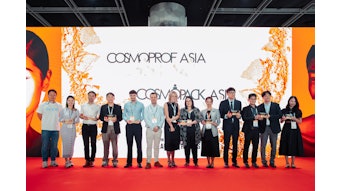Complementary to “The Future of Beauty,” from the October 2008 issue.
GCI: How did Cognis define what it calls its essential pillars of its corporate strategy? What was the impetus? How was it implemented? And what were the challenges of successfully achieving these pillars as ongoing concerns?
Petersen: An increasing awareness among people of the need for an equilibrium between body, spirit and soul, combined with the social requirement for a balance between economic demands and ecological and social compatibility, has given rise to two major long-term trends: wellness and sustainability. Since 2001, Cognis has made these megatrends essential pillars of its corporate strategy. Cognis is meeting the increasing demand expressed by consumers, retail chains, governmental agencies and public authorities for improved environmental protection and sustainable development in all its strategic business units with the “strategy nature” as well as with environmentally compatible and high-performance products based on natural raw materials.
GCI: How were steps toward sustainable development undertaken? Since the Alban Muller began operation under this vision, do was its path toward reaching certain sustainability goals easier than for a company that makes that decision later in its development? What were the challenges?
Muller: We have built a trust-based relation with our farming partners to develop local cultures of various medicinal plants in the French “wheat belt” (Beauce region, in the center of France, all around our factory). We aimed at obtaining plants of the strict quality we wanted, but, also, we expected to cut down delivery delays and transportation distances and costs. My point is that we have no other choice than developing sustainable products, selecting production techniques that respect the environment. And It proves to be an economically sound way to manage. Most people have not realized yet that caring for a sustainable development is simply caring for your company.
There are no specific challenges for our group; I believe this is a better way to manage, taking all aspects of our production process into account. Now, we are going towards the “green balance” for each and every product.
GCI: What are the special considerations given now to any project at Cognis under these pillars ? How deep do these pillars go? Does basing all activities on the principles of sustainable development touch every aspect and all decisions, from small to large, that the company makes?
Petersen: Being successful as an enterprise of course is the top-most priority of Cognis and its management and staff. All our business and corporate activities are however based on the principles of sustainable development—achieving a sensible balance between economic, ecological and social needs without, in any way, compromising the development opportunities of future generations. Cognis is committed to finding a healthy balance between economic, ecological and social demands, both national and global. Cognis pursues sustainable economic success, not only through innovative products and manufacturing processes that offer maximum environmental compatibility, but also through the continuous development and training of our employees.
GCI: Does basing activities on the principles of sustainable development touch every aspect and all decisions, from small to large, that Alban Muller makes?
Muller: Today, yes, because this vision is very well understood and accepted by everyone within the company and by its ecosystem. And when you sincerely start thinking through the spectrum of the sustainable development, you can’t act otherwise, whatever the issue. I cannot describe all the details of our functioning, but I can tell you these efforts are profitable to the environment as well as to the company. Performance and quality are our two additional pillars to the sustainable development pillars.
GCI: What are the longer term ramifications to the company? What does Cognis see as the result and benefits to the environment and, in turn, to Cognis customers?
Petersen: As all our activities are based on the principles of sustainability, it is all the more important for us to maintain a clear focus on ensuring that our manufacturing methods are kept as environmental compatible.
GCI: How often and how are benchmarks that govern environmental compatibility and social responsibility evaluated?
Petersen: Cognis subjects its sites to regular audits, monitoring the high standards of safety, health, and environmental protection. In so-called eco-inventories, Cognis provides its customers with all the environmentally relevant facts and figures relating to its most important products. Regarding aspects like raw material input, energy consumption, effluent, greenhouse gas emissions and non-recyclable solid waste materials, the result below the line shows the measurable ecological superiority inherent in the Cognis’ Strategy for Nature.
In 2002, Cognis launched a wide-ranging program under the general heading “25 by 2012”. Wishing to make a meaningful contribution to reducing environmental impact, Cognis aim in instituting this project is to achieve a 25% reduction in all the major indicators – that is to say specific energy consumption, emissions and wastewater, among others—by the year 2012. This overall company target is reflected facility by facility in Cognis’ Master Plan processes, whereby specific site conditions are taken into account. The environmental targets are accompanied by ambitious goals in the fields of raw material sourcing, safety, health and human resources, the purpose being to focus the organization on all those essential aspects that characterize a sustainable company.
GCI: What are the longer term ramifications to the company? What does Alban Muller International see as the result and benefits to the environment and, in turn, to its customers?
Muller: For example, we have totally modified our processes to produce our extracts. It was necessary to be able to use recyclable solvents, to avoid the use of preservatives (for that we introduced specific pasteurization technologies), and to reduce fuel consumption, etc. Customers and consumers do understand that they have to participate [in the management] of resources for their planet and their descendants.
GCI: Beyond fiscally trackable or chartable metrics, how has Alban Muller International’s vision impacted its as a corporate citizen? What is the feel good factor and how does that, in itself, impact practical business matters?
Muller: Pride is a potent motivation factor, and I believe our co-workers are particularly proud to work in a company respecting the environment for them and their children.
GCI: What do sustainable development efforts mean to the beauty industry as a whole? How do corporate efforts such as Alban Muller International’s parlay into the lives of consumers?
Muller: The cosmetic industry is generally considered as dealing with frivolity only. When you get to know this industry better, you realize the amount of technical work, the sum of precaution, the extreme care for safety, the quality control and the process optimization processes behind each and every product. Therefore our industry is often [attacked] by all kinds of “buzz attacks”—parabens, stress on the environment by bio-accumulation, slow poisoning by skin permeation (the numbers given would push the average consumption per head to more than 100 jars a year!). I believe we should take the sustainable development’s approach (which includes organic growing, selection of preservatives, extra care for health, biodegradability) to better and clearly communicate on the huge efforts our industry is already doing and will go on doing.










